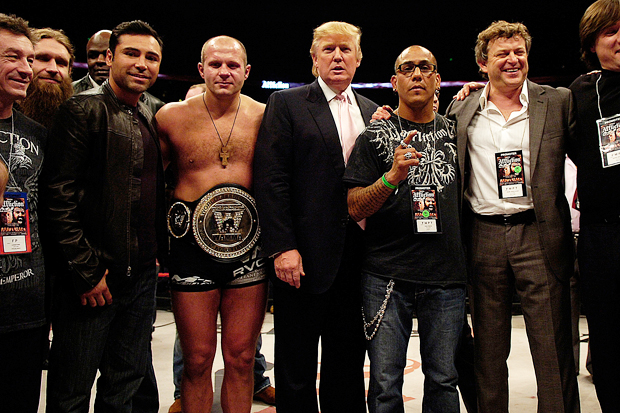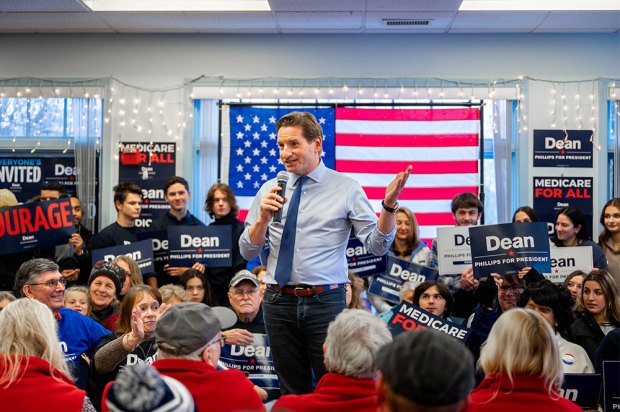Last month a rich, boastful alpha male savoured the greatest victory of his life in New York City. Almost no one thought he could do it, but he made it look easy. In the build-up he ridiculed his opponent mercilessly and feuded with enemies on Twitter. ‘I’d like to take this chance to apologise,’ he said straight after his win, ‘to absolutely nobody!’
This wasn’t Trump Tower, but Madison Square Garden. Conor McGregor had just become the first two-weight champion in Ultimate Fighting Championship (UFC) history. Thanks to the Irishman, who combines the athletic talent of Muhammad Ali with the comic ferocity of Bill Hicks, the event broke the arena’s ticket revenue record. Yet his sport of mixed martial arts was only legalised in New York State this year. The UFC had finally elbowed its way into America’s sporting mainstream.
Donald Trump had wanted to be there that night to celebrate his own unlikely triumph in the US elections. Secret Service agents reportedly persuaded him to stay at home. Why was the next President of the United States so eager to attend an event that would have probably horrified his predecessors? Simple: he loves a sport that is, in essence, a battle for physical dominance. ‘It’s sort of like, you just — somebody dies!’ he once said. ‘I’ve never seen anything like it… It’s not like, “Oh, how are the judges voting?” It’s like, you know, somebody just succumbs.’
The UFC’s first show was in Denver in 1993. It aimed to settle an age-old question: what is the world’s most effective martial art? The organisers wanted to separate true martial artists from practitioners of ‘Bullshido’: self-proclaimed masters boasting of their ‘secret death punch’. They did this by throwing them into a cage and seeing who prevailed. The bouts were nasty, brutish and short. In the first, a French kickboxer struck a sumo wrestler so hard in the face that two teeth were later found embedded in his foot. The tournament winner was a Brazilian jiu–jitsu expert, Royce Gracie, who beat a hapless one-gloved boxer, a wrestler and the kickboxer en route to victory.
This blood-spattered new sport — described by fight commentator Joe Rogan as ‘short-attention-span theatre’ — quickly gained a cult following. It also inspired moral panic. Senator John McCain called it ‘human cockfighting’, tried to keep it off cable television and pushed for a nationwide ban.
In 2001, Las Vegas casino owners Frank and Lorenzo Fertitta bought the UFC for $2 million. Thanks to the backlash, the firm had been reduced to untelevised tournaments in dingy civic centres. Then the Donald stepped in. He hosted two UFC shows at the Trump Taj Mahal in Atlantic City, a gesture that arguably saved the company from oblivion. That’s why Dana White, the Fertitta brothers’ bald-domed frontman, endorsed Trump at the Republican National Convention in July. ‘State athletic commissions didn’t support us,’ White recalled. ‘Arenas around the world refused to host our events. Nobody took us seriously. Nobody except Donald Trump. Donald was the first guy that recognised the potential that we saw in the UFC and encouraged us to build our business.’
White, a potty-mouthed former aerobics instructor, is an intriguing figurehead for the sport. A veteran gambler, he claims to have lost a million dollars in a single evening and fears he suffered brain damage as an aspiring young boxer. Fame has brought detractors: his own mother wrote an unauthorised biography that, in one of its kinder passages, described him as ‘egotistical, self-centred, arrogant and cruel’. That’s harsh: he comes across as honest, likeable and commendably ambitious. He believes that mixed martial arts will soon be bigger than the World Cup. In his Republican convention speech, White omitted one notable fact: that after Trump saved the UFC, he tried to destroy it. In 2008, the billionaire backed a short-lived rival promotion, Affliction Entertainment. In a direct challenge to the UFC, the company signed Fedor Emelianenko, then the world’s most feared mixed martial artist. Trump appeared with the fighter, a quiet, bear-like man famous for felling bigger opponents with his looping ‘Russian hook’. ‘His thing is inflicting death on people,’ Trump said admiringly. They planned to promote the brand in Russia. Trump never made it there, but if he had he might have secured powerful connections: Emelianenko counted Vladimir Putin among his biggest fans.
When a reporter asked Trump if Affliction would surpass the UFC, he replied: ‘It probably will… all the fighters want to be with us, and I think it probably will take over.’ But the firm folded in 2009 after two events. It’s unclear whether Trump lost money (some say he had just lent his name) but the episode underlined his status as the godfather of mixed martial arts. Later, he was inducted into the New Jersey State Martial Arts Hall of Fame with a one-word commendation: ‘Visionary’, despite fighting just once in public himself: at WrestleMania XXIII, when he body-slammed the promoter Vince McMahon before pretending to pummel him on the ground. (YouTube preserves the surreal spectacle for posterity.)
Liberal commentators have noticed that the UFC is coming of age just as Trump is coming to power. Macho, politically incorrect men are back at the zenith of western culture, and the liberals don’t like it.
Yet it’s not entirely fair to portray the UFC as the sporting embodiment of Trumpism: crude, money-loving and lawless. Yes, the sport has a dark side: drugs, skull fractures and criminal connections. But not all fighters fit the obnoxious mould: there are quiet gentle-men, such as Demian Maia, who let their results do the talking, and kind–hearted types like Cody Garbrandt, who has befriended a young cancer survivor. The promotion is also solidly ‘globalist’, with fighters from some 50 countries. And apart from marketing genius, a taste for luxury and a contempt for weakness, Trump and Conor McGregor have little else in common.
Last July the Fertitta brothers sold the UFC to the talent agency WME-IMG for $4 billion — the biggest sporting transaction of all time. Under its swish new owners, who include Mark Wahlberg, Ben Affleck and Maria Sharapova, the firm is leaving its seat-of-the-pants days behind it. The business no longer needs Trump to succeed. But it won’t hurt to have a fan in the White House. Especially as it now seeks to expand to — you guessed it — Russia. With boxing on the ropes and pro wrestling mere pantomime, the UFC can make combat sports great again.
The post Ultimate fighting president appeared first on The Spectator.
Got something to add? Join the discussion and comment below.
Get 10 issues for just $10
Subscribe to The Spectator Australia today for the next 10 magazine issues, plus full online access, for just $10.
You might disagree with half of it, but you’ll enjoy reading all of it. Try your first month for free, then just $2 a week for the remainder of your first year.














Comments
Don't miss out
Join the conversation with other Spectator Australia readers. Subscribe to leave a comment.
SUBSCRIBEAlready a subscriber? Log in